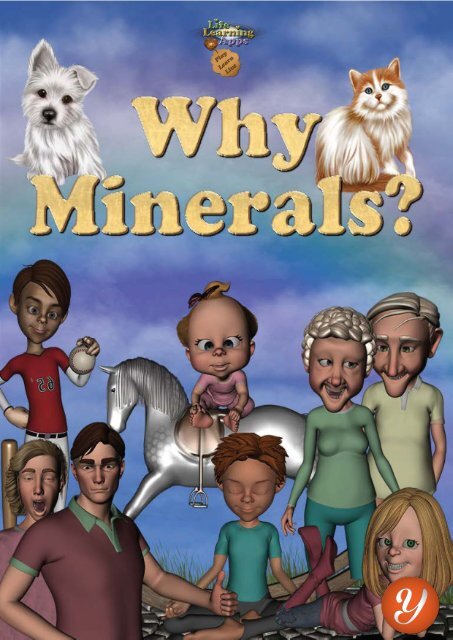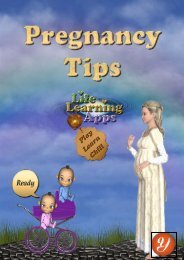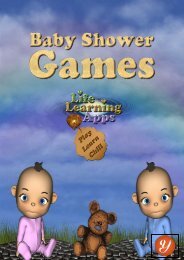Why Minerals?
Here is a guide for the function of minerals and why PLANT DERIVED minerals are essential for optimum health.
Here is a guide for the function of minerals and why PLANT DERIVED minerals are essential for optimum health.
Create successful ePaper yourself
Turn your PDF publications into a flip-book with our unique Google optimized e-Paper software.
!<br />
!<br />
Disclaimer
We recommend:<br />
Liquid Plant Derived <strong>Minerals</strong> or Capsules: 30 mls - straight, taken with water or<br />
added to your shake.<br />
Recommended to take in the morning on a empty stomach or just before bed time.<br />
!<br />
We recommend:<br />
!<br />
Paradise Nutrients VeggieMin capsules (also comes in liquid form which can be added to<br />
drinks, cooking, etc.) contain approximately 74+ Plant Derived <strong>Minerals</strong> from A to Z. The<br />
minerals that come from a plant are by far the most bio-available source of minerals outside<br />
of a fresh food source.<br />
!<br />
They have been assimilated or digested by the plant by the process of photosynthesis. This<br />
turns them into carbon-based organic molecules known as water soluble, plant derived,<br />
hydrophilic minerals or Colloidal <strong>Minerals</strong>. According to food chemistry, plant derived<br />
minerals are 98 to 100% absorbable by the body. Generally they are 200 to 2,000 times<br />
smaller than metallic minerals. Some Colloidal <strong>Minerals</strong> are no larger than 0.000001 micron<br />
and are capable of being readily absorbed into the blood stream and the cells of the body.<br />
These microscopic minerals are in liquid suspension.<br />
Plant Derived Colloidal <strong>Minerals</strong> are water soluble and carry a natural negative electrical<br />
charge. These are two very important benefits.<br />
1. Greatly enhanced the transport, availability and absorbability of<br />
other nutrients from foods and/or vitamins and other supplements.<br />
2. The ability to attract toxins and heavy metals from the body and<br />
flush them out. A colloid is a particle substance that retains its<br />
identity and remains in suspension.<br />
!<br />
Paradise Nutrients is an 100% Australian owned local company<br />
which is based in 'sunny' Queensland. They produce many<br />
nutritional products that improve your health as well as a range of<br />
products to improve the health of animals, especially when used on<br />
a daily basis. Their motto is 'Prevention is better than cure". Their<br />
laundry, cleaning, personal care and garden products are first<br />
choice organic, safe and non-toxic with no known cancer causing<br />
ingredients. Everyone who wants to shop for 'everyday safe<br />
products at the one place' for themselves, their family and/or their<br />
pets, have the choice of shopping online or phoning the PN office<br />
during office hours to order and your goods are delivered in just a<br />
few days directly to your door! Wholesale Prices are also a great<br />
option!<br />
If you would like to know how you can purchase great health and safe and non-toxic<br />
products, at wholesale prices direct to your door, we can help you do that very simply. Click<br />
the image above for a WHOLESALE account, delivered WORLDWIDE.
<strong>Minerals</strong> and their functions<br />
What are minerals and where do they come from?<br />
<strong>Minerals</strong> are inorganic elements which means that no living thing, plant or animal is able to<br />
manufacture or create them. <strong>Minerals</strong> have to be obtained externally from the food of the plant,<br />
animal or human. For plants, the minerals have to come from the soil in which they are grown.<br />
As human beings and animals cannot readily absorb minerals directly from the soil, their minerals<br />
have to come from the plants and foods they eat. There a basically two types of minerals.<br />
Metallic <strong>Minerals</strong> and Colloidal <strong>Minerals</strong>.<br />
Metallic <strong>Minerals</strong><br />
Metallic <strong>Minerals</strong> are inorganic and come straight from the ground or soil needing to be processed<br />
by plants before they can become a good nutritional fit for humans and animals. These metallic<br />
minerals can be toxic to the human body. Dangerous levels of these metallic minerals can<br />
accumulate in tissues and organs creating serious health problems. However, some metallic<br />
minerals taken in by the body can be broken down by the acids in the stomach and a small amount<br />
will become available to the body. In most cases these should be avoided to prevent heavy metal<br />
build up. Many mineral supplements available on the supermarket shelf are metallic minerals that<br />
have been processed by chemicals or another process, but they are still inorganic minerals.<br />
Colloidal (Plant Derived <strong>Minerals</strong>)<br />
Plant derived minerals come from plants. Plants get their minerals from the soil and through a<br />
natural process these minerals are transformed into organic minerals and become much more<br />
available to the body. The role plants play to convert inorganic minerals to organic minerals should<br />
not be under estimated because it is while minerals are going through that important transformation<br />
that other essential nutrients are added. Plants can process and store as many 80 or more minerals if<br />
they are available in the soil.<br />
One of the most important things a plant does to a mineral is change its polarity (electrical charge).<br />
It is believed that this is how the body recognises the organic minerals and absorbs them as they<br />
pass through the colon. The colon wall produces the opposite polarity and this attracts the organic<br />
minerals to it. This polarity is also important in detoxifying the body of heavy metals.<br />
Inorganic minerals (metallic) and other elements that are not absorbed by the body can build up and<br />
be difficult to flush out. This is where plant derived minerals (organic) play an important role. Having<br />
the opposite polarity or charge, it has been shown that by ingesting slightly more organic minerals<br />
than the body needs (and therefore not absorbing the excess), the excess organic minerals will<br />
attract the metallic minerals and help drag them out of the body. It is also important to keep in mind<br />
that heavy metals and other pollutants can be absorbed every day through the water we drink, the air<br />
we breathe, and the many other products that we either use or come in contact with on a daily basis.<br />
This is why Paradise Nutrients is committed to both manufacturing and marketing non-toxic and ecofriendly<br />
products to give you an eco-friendly home environment and providing a superior mineral<br />
range for your detox assistance and general well being.
Sea <strong>Minerals</strong> are another form of organic and non-organic minerals, but largely in an organic<br />
state. This includes the hormonal form of Vitamin D, essential for bone building. An appropriate<br />
marriage between these two sources of minerals supplies the widest spectrum of minerals known.<br />
In early days our soils may have been rich and fertile but over the thousands of years a lot of the<br />
minerals in our soils have been eroded away and washed down the rivers into the sea including<br />
plant mater and heavy metals. Once these minerals and nutrients do find their way into the sea<br />
there is another process that takes place. Continuous churning and breaking down of nutrients<br />
and natural chemical reactions allow these important mineral nutrients provide the life in the sea<br />
with much needed energy. Sea plants, kelp forests and grasses all need these minerals for their<br />
survival and thus the food chain starts. In recent years it has been discovered that some sea<br />
mineral extracts contain a combination of both organic and inorganic minerals giving a widely<br />
generous range of minerals.<br />
<strong>Why</strong> can't we get the minerals from our foods?<br />
Australia was once a country with rich fertile valleys and forests; our soils were bursting with<br />
minerals and soil life that kept replenishing and feeding itself and the life it supported.<br />
But over thousands of years our soils have changed through weathering and acts of nature but<br />
even more so in the most recent 200 years. Since Europeans came to Australia many of our soils<br />
were farmed and grazed extensively using techniques and practices from the country from which<br />
they came. Not understanding these soils caused problems like erosion, soil compaction and<br />
fertility loss. Then there was the chemical age. While it seemed to be good in boosting production<br />
and growth, the use of these high nutrient fertilisers and pest controlling chemicals have mined<br />
our soils like no other time. Like all minerals once they are mined they are gone forever. Now,<br />
with a populated hungry world, farmers and food producers are looking to get more from their soils<br />
at the best economical price and the cheapest way is to use chemicals. Our soil once carried<br />
over 75 minerals and now only contains about 20 minerals.<br />
<strong>Why</strong> do we need minerals?<br />
<strong>Minerals</strong> play an important role in almost every function in the body. The human body must<br />
maintain a proper chemical balance. This balance depends on the levels of different minerals and<br />
the ratio of these minerals one to another. What we need to be conscious of is that, not only are<br />
other minerals affected when our mineral balance is a little tilted, but other essential nutrients as<br />
well. The fact is that without all of the essential minerals, the body cannot properly utilise<br />
important nutrients like vitamins, amino acids, fatty acids and hormone production and this can<br />
start a chain reaction of imbalance that can lead to illness. <strong>Minerals</strong> have an impact on many<br />
areas of our bodies. Some examples are: the formation of blood and bone, the proper functioning<br />
of body fluids, the maintenance of a healthy nervous system, the regulation of muscle tone, the<br />
regulation of the cardio system, energy production, healing and growth, enzyme production and<br />
they play a critical role in DNA synthesis. <strong>Minerals</strong> also help balance Ph levels and assist in<br />
maintaining a healthy immune system. Taking the right minerals will assist in detoxifying our<br />
bodies of excessive heavy metals or metallic minerals,the formation of blood and bone, proper<br />
composition of body fluids, the maintenance of a healthy nerve system, the regulation of muscle<br />
tone, the regulation of cardiovascular system, used for healing and growth, to utilise vitamins and<br />
other nutrients, for the production of enzymes, Is essential for hormone structure, critical in DNA<br />
synthesis, helps balance Ph levels, helps neutralize toxic metals, assists the immune system,<br />
assists with fatigue management, keeping a healthy reproductive system and sexual performance.
Aluminum<br />
Functions as an enzyme co-factor activating the enzyme succinic dehydrogenase (a vital enzyme for the<br />
completion of the Citric Acid Cycle, which occurs in every cell of our body for the purpose of metabolizing<br />
food into energy)<br />
Arsenic<br />
Deficiency:<br />
Repetitive motion degeneration, i.e. TMJ and carpal tunnel<br />
Antimony<br />
Effective against blood flukes<br />
Bismuth<br />
Ulcers result from lack of Bismuth and the bacteria, Helicobacter pylori<br />
Boron<br />
Aids efficient calcium and magnesium use<br />
Essential for bone metabolism<br />
Proper endocrine function<br />
Reduce calcium loss from bones (osteoporosis)<br />
Calcium<br />
High protein diets increase demands for calcium<br />
Deficiency:<br />
Arthritis<br />
Back pains (sciatica, disc problems)<br />
Bell’s Palsy<br />
Bone spurs<br />
Brittle fingernails<br />
Calcium deposits<br />
Cognitive impairment<br />
Delusions<br />
Depression<br />
Eczema<br />
High blood pressure<br />
Hyperactivity<br />
Hypertension (high blood pressure)<br />
Insomnia<br />
Irritability<br />
Kidney stones<br />
Limb numbness<br />
Muscle Cramps/spams/twitches<br />
Nervousness<br />
Neuromuscular excitability<br />
Osteitis fibrosis (enlargement of bones with scar tissue)<br />
Osteomalacia (failure to mineralize the protein bone matrix)<br />
Osteoporosis (and Dowagers Hump, Spontaneous fractures, kyphosis)<br />
Panic attacks<br />
Pica (eating lead paint)<br />
Periodontal disease – receding gum (osteoporosis od facial and jaw bones)<br />
PMS<br />
Rickets<br />
Retarded growth<br />
Tetany<br />
Tooth decay
Caesium<br />
Cancer aid:<br />
Caesium enters cancer cell and produces alkaline condition<br />
Chromium<br />
Deficiency:<br />
ADD/ADHD<br />
Anxiety<br />
Aortic cholesterol plaque<br />
Coronary blood vessel disease<br />
Depression/Manic depression<br />
Diabetes (vanadium also)<br />
Dr. Jekyll/Mr. Hyde rages<br />
Elevated blood cholesterol<br />
Elevated blood triglycerides<br />
Fatigue<br />
Hyperactivity<br />
Hypercholesterolemia<br />
Hypoglycaemia-low blood sugar (vanadium & copper also)<br />
Infertility and decreased sperm count<br />
Learning disabilities<br />
Negative nitrogen balance ( body lean mass/protein loss)<br />
Pre-diabetes (vanadium also)<br />
Peripheral neuropathy<br />
Retarded growth<br />
Shortened life span<br />
Cobalt<br />
Deficiency:<br />
Anaemia<br />
Anorexia<br />
Emaciation, listless, starved look, pale mucous membranes<br />
essential part of Vitamin B 12 (Growth and nerve system function)
Copper<br />
Deficiency:<br />
Alopecia (hair loss)<br />
Anaemia (common in vegans and high milk users)<br />
Aneurysms (or blood vessel wall bulges)<br />
Aneurysm/cerebral haemorrhage<br />
Arthritis (especially where growth plates are involved)<br />
Cerebral palsy and hypoplasia (failure to form) of cerebellum<br />
Criminal or violent behavior, blind rage, explosive outbursts<br />
Depression<br />
Dermatosis<br />
Diarrhoea<br />
Dry brittle hair<br />
Fatigue<br />
Fragile bones<br />
Hernias<br />
High blood cholesterol<br />
Hypercholesterolemia<br />
Hypo or Hyper thyroid<br />
Ptosis (sagging tissue – eyelids, skin, breasts, stomach etc.)<br />
Kawasaki Disease<br />
Learning disability<br />
Liver cirrhosis (Number 9 killer in the US)<br />
Ruptured vertebrae discs problems<br />
Reduced glucose tolerance ( low blood sugar)<br />
Respiratory disease<br />
Swachman’s Syndrome<br />
Varicose veins<br />
White or grey hair<br />
Europium<br />
Doubles the life span of laboratory animals<br />
Fluoride<br />
In plant based colloidal form, will aid bone strength and is non-toxic<br />
Germanium<br />
Aid in oxygen utilization<br />
Enhances immune system function (Killer cells, interferon, macro phages and T-suppressor cells)<br />
Highly efficient electrical impulse initiator<br />
Deficiency:<br />
Arthritis<br />
Cancer<br />
Low energy<br />
Osteoporosis
Gold<br />
Reduces active joint inflammation<br />
Iodine<br />
Copper is needed to utilise iodine<br />
Needed by body for thyroid function<br />
(Thyroxin is the thyroid hormone)<br />
Deficiency:<br />
Cold intolerance<br />
Brittle nails<br />
Bulging eyes<br />
Constipation<br />
Depression<br />
Dry skin and hair<br />
Elevated blood cholesterol<br />
Excessive sweating<br />
Fatigue<br />
Frequent bowel movements<br />
Goitre (throat swelling)<br />
Hair loss<br />
Hand tremors<br />
Heat Intolerance<br />
Heavy Period or less than 28 day cycles<br />
Hypothyroidism or under-active thyroid<br />
Increased appetite<br />
Irritability<br />
Inability to concentrate<br />
Light periods or longer than 28 day cycle<br />
Low basal body temperature<br />
Low sex drive<br />
Muscle aches and pains<br />
Muscle cramps<br />
Muscle weakness<br />
Nervousness<br />
Over-active thyroid<br />
Poor Memory<br />
Puffy face<br />
Weight gains<br />
Weight loss<br />
Dysphagia<br />
Iron<br />
Deficiency:<br />
Anemia<br />
Angular Stomatitis<br />
Anorexia<br />
Brittle Nails<br />
Confusion<br />
Constipation<br />
Depression<br />
Dirt eating (pica)<br />
Dizziness<br />
Fatigue<br />
Fragile bones<br />
Gastro-intestinal upset<br />
Growth retardation<br />
Headaches<br />
Ice eating (pica)<br />
Heart palpitations<br />
Haemoglobin (oxygen carried in red blood<br />
cells)<br />
Irritability and fatigue<br />
Memory deficits<br />
Sore tongue<br />
Lanthanum<br />
Deficiency:<br />
May be involved in chronic fatigue diseases<br />
Lithium<br />
Deficiency:<br />
ADD<br />
Depression<br />
Infertility<br />
Lithium deficiency aggravated by high sugar<br />
consumption<br />
Manic depression<br />
Rages and fits<br />
Reduce growth rate<br />
Reproductive failure<br />
Shortened life span
Magnesium<br />
Deficiency:<br />
Anxiety<br />
Asthma<br />
Anorexia<br />
Birth defects<br />
Calcification of small arteries<br />
Confusion<br />
Depression<br />
Growth failures<br />
Hyperactivity/synophobia<br />
Hypotension<br />
Hypothermia<br />
Insomnia<br />
Irritability<br />
Malignant calcification of soft tissue<br />
Menstrual Migraines<br />
Muscle pains/tremors/weakness<br />
Nervousness/neuromuscular irritability<br />
Neuromuscular problems<br />
Restlessness<br />
Seizures<br />
SIDS<br />
Tachycardia/palpitations<br />
Tetany – Convulsions<br />
Tremors<br />
Vertigo<br />
Manganese<br />
Deficiency:<br />
Asthma<br />
Ataxia<br />
Atherosclerosis<br />
Chrondromalacia<br />
Chondrodystophy<br />
Convulsions<br />
Dizziness<br />
Hearing loss<br />
Hypercholesterolemia<br />
Hypoglycemia<br />
Infertility (failure to ovulate or testicle atrophy)<br />
Loss of sex drive<br />
Pancreatic atrophy<br />
Poor cartilage formation problems<br />
TMJ, Carpal Tunnel Syndrome<br />
Retarded growth rates<br />
Shortened long bones<br />
Molybdenum<br />
Essential as a metalloenzyme of several enzyme<br />
systems<br />
en-<br />
Neodymium<br />
Doubles life span of laboratory animals<br />
hances cell growth<br />
Nickel<br />
Deficiency:<br />
Anaemia (low hematocrit)<br />
Delayed puberty<br />
Depressed oxidative ability of the liver<br />
Dermatitis<br />
High newborn mortality<br />
Poor growth<br />
Poor zinc absorption<br />
Rough/dry hair coats in animals<br />
Phosphorus<br />
Deficiency:<br />
Anorexia<br />
Anxiety<br />
Apprehension<br />
Bone pain<br />
Dyspnoea (shortness of breath)<br />
Fatigue<br />
Irritability<br />
Numbness<br />
Parenthesis<br />
Pica<br />
Tremulousness<br />
Weakness<br />
weight loss
Potassium<br />
Deficiency:<br />
Acne<br />
Arrhythmia<br />
Cognitive impairment<br />
Constipation<br />
Depression<br />
ECG changes<br />
Oedema<br />
Fatigue<br />
Glucose intolerance<br />
Growth Retardation<br />
Hypercholesterolemia<br />
Hyperreflexia<br />
Hypotension<br />
Insomnia<br />
Mental Apathy<br />
Muscular weakness<br />
nervousness<br />
Palpitations<br />
Polydipsia<br />
Proteinuria<br />
Repertory distress<br />
“Salt” retention<br />
Tachycardia<br />
Xerosis<br />
Praseodymium<br />
Doubles life span in laboratory animals<br />
Enhances normal cell growth<br />
Samarium<br />
Doubles the life span of laboratory animals<br />
Enhances normal cell proliferation<br />
Cancer prevention properties<br />
Animal studies show deficiencies cause<br />
Hearing loss<br />
Male pattern baldness<br />
Poor growth and poor feeding<br />
Selenium<br />
Effective anti-oxidant<br />
Deficiency:<br />
Age spots or liver spots<br />
ALS (Lou Gehrig’s Disease)<br />
Alzheimer’s Disease (associated high vegetable<br />
oil consumption)<br />
Anaemia (red blood cell fragility)<br />
Cardiomyopathy<br />
Cataracts<br />
Cancer risk<br />
Cystic fibrosis<br />
Cancer (associated with high vegetable oil intake)<br />
Fatigue<br />
Growth retardation<br />
Heart palpations (irregular heart beat)<br />
High infant mortality<br />
HIV (AIDS)<br />
Impaired immunity<br />
Infertility<br />
Keshan Disease (myocardial fibrosis)<br />
Liver cirrhosis<br />
Low birth weight<br />
Multiple sclerosis<br />
Muscular dystrophy<br />
Myalgia<br />
Pancreatitis<br />
Pancreatic atrophy and fibrosis<br />
Parkinson’s Disease (associated with lead<br />
poisoning)<br />
Scoliosis<br />
Sterility in males<br />
Sudden Infant Death Syndrome (SIDS)<br />
Sickle cell anemia
Silica<br />
Increases collagen in growing bone by 100%<br />
Deficiency:<br />
Brittle fingernails<br />
Dry brittle hair<br />
Poor calcium utilization arterial wall<br />
strength problems<br />
Poor skin quality<br />
Silver<br />
Anti-bacterial<br />
Anti-fungal<br />
Anti-viral<br />
Kills over 650 disease causing organisms.<br />
Systemic disinfectant<br />
Immune support.<br />
Subdues inflammation<br />
promotes healing<br />
Strontium<br />
Involved in functions of haemoglobin, insulin hormone<br />
adrenal hormones, enzymes and antibodies<br />
Deficiency:<br />
Degeneration of cartilage, ligaments, and tendons<br />
Lupus<br />
Several Collagen diseases<br />
Sickle cell anaemia<br />
Thulium<br />
Doubles the life span of laboratory animals<br />
Enhances growth of normal cells<br />
Vanadium<br />
Aids in glucose (blood sugar levels)<br />
Anti-Cancer properties<br />
Decreases cholesterol production<br />
Enhances insulin effectiveness (aids with blood sugar<br />
problems)<br />
Increases effectiveness of heart muscle contraction<br />
Deficiency:<br />
Cardiovascular and triglycerides<br />
Diabetes<br />
Elevated cholesterol and triglycerides<br />
Hypoglycaemia<br />
Increased infant mortality<br />
Infertility<br />
Obesity<br />
Slow growth<br />
Yttrium<br />
Doubles life span of laboratory animals<br />
Enhances normal cell growth<br />
Zinc<br />
Zinc deficiency associated with congenial birth<br />
defects:<br />
Brain defects, cleft lip and cleft palate<br />
Clubbed limbs<br />
Down’s syndrome<br />
Heart and lung defects<br />
Hiatus hernia & umbilical hernia<br />
Small or absent eyes<br />
Spina bifida<br />
Urogenital defects<br />
Webbed toes or fingers<br />
Deficiency:<br />
Acne<br />
Acrodermatitis enteropathica<br />
Alopecia (hair loss)<br />
Anaemia<br />
Anorexia and/or bulimia<br />
Apathy<br />
Birth defects (see above)<br />
Bad body odor (“smelly tennis shoe” syndrome)<br />
Brittle nails<br />
Depression<br />
Diarrhoea<br />
Enlarged prostate<br />
Eczema<br />
Fatigue<br />
“Frizzy” hair<br />
High infant mortality<br />
Hypercholesterolemia<br />
Hypogewusia (loss of sense of taste)<br />
Infertility<br />
Impaired wound hearing<br />
Impotence<br />
Irritability<br />
Lethargy<br />
Loss of sense of smell<br />
Malabsorption<br />
Memory loss<br />
Paranoia<br />
Pica (eating hair, wool etc.)<br />
Poor growth (short stature)<br />
Sexual immaturity (remain in pre-puberty state)<br />
Small and/or poor ovary and testes function<br />
Sterility<br />
Weaken immune function<br />
White Spots on nails
Vitamin and Nutrient Deficiency Symptoms<br />
Biotin<br />
Deficiency:<br />
Alopecia (hair loss)<br />
Anaemia<br />
Anorexia and nausea<br />
Depression<br />
Fatigue<br />
Hypercholesterolemia<br />
Hyperglycemia (diabetes)<br />
Insomnia<br />
Muscle pain and weakness<br />
Dry, greyish skin<br />
Pale smooth tongue<br />
Essential Fatty Acids (EFAs)<br />
Also knows as Omega 3, 6 and 9<br />
Deficiency:<br />
Acne<br />
Alopecia (hair loss)<br />
Arthritis<br />
Atrophy of endocrine glands<br />
Diarrhoea<br />
Dry brittle hair<br />
Eczema<br />
Endocrine dysfunction<br />
Fatty degeneration of the liver<br />
Gall stones<br />
Growth retardation<br />
Immunologic dysfunction<br />
Impaired wound healing<br />
Infertility<br />
Kidney dysfunction<br />
Positive sweat test (cystic fibrosis, anorexia nervosa etc.)<br />
Xerosis<br />
Folic acid<br />
Deficiency:<br />
anaemia (megaloblastic)<br />
Anorexia<br />
Apathy<br />
Birth defects (spina bifida, Hydroeccephalaocoels)<br />
G I upsets/diarrhoea<br />
Dyspepsia<br />
Geographic tongue<br />
Growth retardation<br />
Headaches<br />
Insomnia<br />
Memory loss<br />
Paranoia<br />
Vitiligo<br />
Weakness<br />
Inositol<br />
Deficiency:<br />
Alopecia (hair loss)<br />
Constipation<br />
Eczema<br />
Hypercholesterolemia<br />
Niacin<br />
Deficiency:<br />
Anorexia and Nausea<br />
Canker sores<br />
Confusion<br />
Depression<br />
Dermatitis (localized scaly)<br />
Dark pigmented dermatitis<br />
Diarrhoea<br />
Dyspepsia<br />
Crying jags, emotional<br />
Fatigue<br />
Halitosis (bad breath)<br />
Headaches<br />
Insomnia<br />
Irritability<br />
Limb pains<br />
Memory loss<br />
Muscular weakness<br />
Skin eruptions/eczema
Para Aminobenzoic Acid<br />
Deficiency<br />
Constipation<br />
Depression/headache/irritability<br />
Fatigue<br />
G I disorders<br />
Greying hair<br />
Vitamin A<br />
Deficiency:<br />
Acne<br />
Anosmia (loss of smell)<br />
Birth defects<br />
Dry hair/Alopecia (hair loss)<br />
Fatigue<br />
Growth Retardation<br />
Hyperkeratosis<br />
Infections<br />
Infertility<br />
Insomnia<br />
Night blindness<br />
Weight loss<br />
Xerosis<br />
Vitamin B-1 (Thiamine)<br />
Deficiency:<br />
Anorexia<br />
Brain atrophy (senility)<br />
Confusion<br />
Constipation<br />
Co-ordination impairment<br />
Depression<br />
Dyspnea (labored breathing)<br />
G I upset<br />
Oedema<br />
Fatigue<br />
Irritability<br />
Memory loss<br />
Muscle atrophy<br />
Nervousness<br />
Numbness hands and feet<br />
Pain hypersensitivity<br />
Palpitations<br />
Sonophobia<br />
Weakness<br />
Vitamin B-2 (Riboflavin)<br />
Deficiency:<br />
Alopecia (hair loss)<br />
Blurred vision<br />
Cataracts<br />
Cheilosis<br />
Depression<br />
Dermatitis (drying, greasing, scaling)<br />
Dizziness eyes (itching, burning, red)<br />
Geographic tongue<br />
Growth retardation Pancreatic atrophy<br />
and fibrosis Photobia<br />
Vitamin B-5 (Pantothenic Acid)<br />
Deficiency:<br />
Abdominal Pain<br />
Alopecia (hair loss)<br />
Burning feet<br />
Co-ordination impairment<br />
Depression<br />
Eczema<br />
Faintness/fatigue<br />
Hypotension<br />
Infections<br />
Insomnia<br />
Muscle spams<br />
Nausea and vomiting<br />
Nervousness<br />
Tachycardia<br />
Vitamin B-6 (Pyridoxine)<br />
Deficiency:<br />
Acne<br />
Alopecia (hair loss)<br />
Anaemia<br />
Anorexia and nausea<br />
Arthritis<br />
Cheilosis<br />
Conjunctivitis<br />
Depression<br />
Dizziness<br />
Facial oiliness<br />
Fatigue<br />
Geographic tongue<br />
Impaired wound healing<br />
Irritability<br />
Nervousness<br />
Neurologic symptoms<br />
Seizures<br />
Stomatitis<br />
Stunted growth<br />
Weakness
Vitamin B-12<br />
Deficiency<br />
Achlorhydria<br />
Anaemia<br />
Birth defects<br />
Constipation<br />
Depression<br />
Dizziness<br />
Dyspnoea (labored breathing)<br />
Fatigue<br />
G I upset<br />
Geographic tongue<br />
Headache<br />
Irritability<br />
Moodiness<br />
Numbness<br />
Palpitations<br />
Psychosis<br />
Spinal cord degeneration<br />
Vitamin E<br />
Deficiency:<br />
Alopecia (hair loss)<br />
Areflexia<br />
Dermatitis<br />
Gait disturbance<br />
Infertility<br />
Malabsorption<br />
Muscular dystrophy<br />
Ophthalmoplegia<br />
Proprioception problems<br />
RBC fragility<br />
Vibratory sense dysfunction<br />
Vitamin K<br />
Deficiency:<br />
Poor clotting time<br />
Osteoporosis<br />
Vitamin C<br />
Deficiency:<br />
Bleeding gums/loose gums<br />
Depression/malaise/tiredness<br />
Easy bruising<br />
Impaired wound healing<br />
Irritability<br />
Joint pain<br />
Vitamin D<br />
Deficiency:<br />
Burning in mouth and throat<br />
Diarrhoea<br />
Insomnia<br />
Myopia<br />
Nervousness<br />
Osteomalacia<br />
Rickets
<strong>Why</strong> do we need to supplement?<br />
With many of our foods coming from depleted soils our daily diets may be lacking many of those<br />
important minerals we need on a daily basis. Because this we don't know what minerals we are<br />
missing out on in any one day. Supplementing our daily food intake with a broad spectrum of plant<br />
derived minerals guarantees our bodies of at least some of the minerals required on that day.<br />
Paradise Nutrients supplies a range of products that contains a broads spectrum of at least 74 plus<br />
plant derived minerals. These include-:<br />
Table minerals. A salt replacement to top up your meals.<br />
VeggiMin Capsules with 74Plus plant minerals<br />
Mineral Drinks as a refreshing drink<br />
Other products that contain plant derived minerals to help maintain the mineral content of your food<br />
and body.<br />
Can I take too many minerals ?<br />
With plant derived minerals a little more than is needed is ok; the body will utilise what it needs and<br />
the rest will pass out as waste. A little excess can be good because it can help detox the body of<br />
heavy metals attaching to these minerals of the opposite charge helping to drag them out of the<br />
body . However if the minerals are metallic and you consume too much this may cause an excess<br />
of heavy metals and can be hard to dislodge from the body. If you already suffer from an overload<br />
of any one mineral you should be careful of your diet as some foods may be high in certain<br />
minerals. For example, kelp is high in iron and iodine. This could be a problem if you have an<br />
overactive thyroid.<br />
If you are unsure about consuming supplements you should consult your health care professional.
For further info click the image below:

















